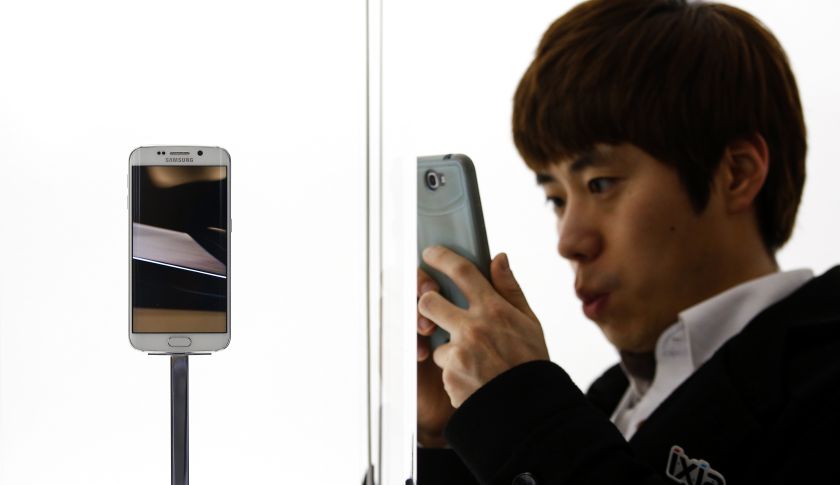(单词翻译:单击)
Once the titan of global smartphone sales, Samsung is looking to retake its throne after Apple made inroads with its iPhone 6 and 6 Plus. On Sunday, in a room filled with technology journalists in Barcelona, Samsung used the 2015 installment of Mobile World Congress to announce the latest models of its Galaxy line of smartphones: the S6 and S6 Edge.
三星一度曾是全球智能手机销量的霸主,在苹果凭借iPhone 6和6 plus强势攫取了不少用户后,此番三星再次携新品汹汹而来,力图夺回王座。上周日在记者云集的巴赛罗纳2015年世界移动通信大会上,三星发布了Galaxy系列手机的最新力作:Galaxy S6和S6 Edge。

Both devices take the Galaxy line in a completely new direction, and on multiple fronts. The most apparent change, at least the first time you lay eyes on the duo, is the noticeable lack of plastic formerly synonymous with Samsung smartphones. With the S6 lineup, Samsung opted to go with a combination of metal and a glass housing.
从多个方面看,这两款手机都将Galaxy系列产品带向了一个全新的方向。最显眼的变化(至少是你一次看到这两款手机的时候),是三星手机的“万年大塑料”不见了,三星为S6系列产品首次配备了“金属+玻璃”的材质组合。
The S6 Edge features a curved display on both edges of the screen, offering enhanced functionality. (An on-stage demonstration showed custom color alerts for incoming calls, and shortcuts to favorite contacts). A revamped fingerprint sensor sits below the home button, foregoing the need for a user to swipe her or her finger across the button. Instead, he or she only needs to place a finger on the button and wait for the scan to complete. The change makes the experience nearly identical to that of Apple’s Touch ID, and appears to eliminate a complaint I had about last year’s Galaxy S5.
S6 Edge首次在屏幕左右两边都采用了曲面屏设计,在功能性上有所提高。(在舞台演示环节中,当有电话呼入时,曲面屏会显示定制的颜色提醒,另外从曲面屏可以快捷进入常用联系人)。Home键下嵌入了一颗经过升级的指纹传感器,使用户无需像S5那样扫屏解锁指纹,而是只需将手指放在Home键上等待扫描完成即可,使用的感觉几乎和苹果的Touch ID一模一样,从而终于打消了我一年前对Galaxy S5指纹识别功能的抱怨。
Sure to disappoint Samsung loyalists, the South Korean company ditched two features long used to mock Apple’s AAPL 0.49% iPhone: expandable storage and a replaceable battery. Looking beyond the aesthetic changes are a faster processor, higher-quality camera, curved display, and wireless charging capabilities.
令不少忠实三星粉感到失望的是,这次三星抛弃了历来被三星粉用来嘲笑苹果的两项“高大上”的技能,即可扩展内存和可更换电池。除了审美层面的变化外,S6还配备了更快的处理器、更高质量的摄像头、曲面屏以及无线充电功能。
There are two features that have made the new Galaxy models more alluring to me than previous editions. The first is called Samsung Pay. The company’s mobile payment solution takes a two-pronged approach by combining a near-field communication (NFC) chip with the magnetic secure-transmission technology it acquired from LoopPay to transmit payment information between your device and a point-of-sale terminal.
S6有两个新功能,使它比以前的Galaxy手机对我更有吸引力。其一是所谓的“三星支付”功能,该方案采取了双管齐下的支付方法,一是集成一块近场通讯芯片,二是集成了三星从LoopPay公司收购的电磁安全传输技术,保障了S6能够与销售点终端系统传送支付信息。
When I reviewed LoopPay last year, I found the technology to be magical, yet disappointing. I was forced to carry around and manage yet another device. The promise behind mobile payments is convenience; the LoopPay fob was not convenient. A quick refresher: You hold the LoopPay fob up to a normal credit card reader, press a button and the machine would interpret the signal in the same manner it would a card being swiped. The payment was then processed, without the machine—and often time the clerk—realizing you did anything different.
去年评测LoopPay的时候,我发现它是一项神奇的技术,但在某种程度上也令人失望,因为我得随时带着另一台设备,并且还得管理它。移动支付的前景在于它的便利性,而LoopPay配件绝对不够便利。当你拿着LoopPay配件接近一台普通的信用卡读卡器并按下按钮时,机器解读LoopPay信号的方式其实与扫描一张普通信用卡没有什么不同。不要说读卡器,就连结账的售货员都没有意识到有什么区别。
Now that that technology is embedded into the device and combined with the ability to use NFC for payments, Samsung Pay is very appealing. And it has a leg up on Apple Pay, which is limited to working only at retail locations and outlets with the necessary equipment to process NFC payments. (This is a drawback I experienced first-hand when I tried to go a week using Apple Pay for every purchase in my small, Colorado town.)
现在这项技术被嵌入到Galaxy S6中,而且与NFC支付技术进行了整合,使三星支付功能变得非常有吸引力。它在技术上领先了苹果的Apple Pay一步,因为后者只能在支持NFC支付的零售场所和终端使用。(这也是我亲身体验的Apple Pay的一个缺点。当时我曾试着在科罗拉多的一个小镇仅凭Apple Pay购买一周的所有用品。)
With Samsung Pay, users won’t be caught in the middle of a spat between competing payment platforms as Apple is with the likes of CVS completely disabling NFC terminals. So go right ahead, CVS, disable NFC. The Galaxy S6 has a trick up its sleeve.
有了三星支付,用户就不用再为了Apple Pay和CVS不支持NFC那点事儿打口水战了。所以CVS不想支持NFC就让它不支持吧,Galaxy S6另有一套绝活对付你呢。
Another thing: Each year when Samsung would announce the latest Galaxy device, it would announce a slew of new software-based features that served little purpose. Having a smartphone watch my eyes, then scroll a webpage or pause a video based on where I’m looking? No thanks. The “enhancements” slowed down the device, drained the battery, and offered little benefit to the end user. In other words, they served only to pad the spec sheet.
另一件事:每年三星推出新款Galaxy手机时,都会顺便发布一大堆基本上没有什么用的软件功能(比如眼球追踪什么的)。这些所谓的“进步”会让设备速度变慢,而且也是耗电大户,且为终端用户提供不了什么福利。换句话说,它的意义就仅限于纸面上。
With this year’s release, Samsung cut the fat, at least with regard to its proprietary user interface known as TouchWiz. Any unnecessary menus or overzealous prompts were left out, it seems. The litany of excess apps notoriously preinstalled on the Galaxy line has been removed. All in all, the company claims to have cut down so-called software bloat by 40 percent, and the phones now include only a trio of Microsoft apps and select Samsung apps (S Health and Milk, Samsung’s music service). At least, until wireless carriers get a hold of it.
在今年的发布会中,三星把这些东西都删去了,至少在它的TouchWiz界面中,貌似所有不必要的菜单和过分热心的提示都不见了。Galaxy手机一向恶评如潮的大量预装软件也不见了踪影。总而言之,三星称已将这些无用软件删减了40%,目前手机上只预装了微软的“三件套”和一些精选三星应用(比如S健康和三星的音乐服务Milk等)——至少在运营商往里掺他们那些玩意儿之前是这样。
For years, Samsung’s flagship phones have been long on features, but short on follow-through—at least to me. The new Galaxy S6 and Galaxy S6 Edge appear to lay the groundwork for a lineup of devices that are quite the opposite.
多年以来,三星的旗舰手机一直是长于功能,短于跟进——至少在我看来是这样。而最新的Galaxy S6和S6 Edge则代表了三星开始选择另一条道路,并为以后的一系列机型奠定了道路。


